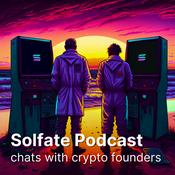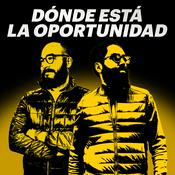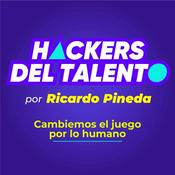Solfate Podcast - Interviews with blockchain founders/builders on Solana
Nick and James

Último episodio
76 episodios
- A conversation with Robin, CEO of Raiku, about Raiku's approach to guaranteed transaction includion on Solana.
📝 Notes from the show
In this episode of the Solfate Podcast, hosts James and Nick welcome Robin, founder of Raiku, to discuss Raiku's approach to guaranteed Solana transaction inclusion using validator sidecars, a decentralized coordination layer, and ahead-of-time block auctions. The conversation covers why L1s hit physical latency limits, how inclusion signals and pre-reserved blockspace reduce dropped transactions and retry spam, and where Raiku differs from existing infrastructure like Jito bundles. Robin shares his background from Ethereum and Hyperledger, why he chose Solana, what’s shipping in Raiku's testnet v1 vs v2, and how validator incentives, pricing modules, and oracle speed factor into high-performance DeFi applications.
- 00:00 Intro and elevator pitch for Raiku
- 03:20 Robin’s background, Ethereum years, and lessons from L2s
- 06:34 Why Solana: tech maturity, dev mindshare, edge compute interest
- 10:24 Problems to solve: predictability, fragmentation, validator alignment
- 13:44 Architecture: validator sidecar, coordination node, block auctions
- 16:27 Raiku vs Jito bundles and mempool latency
- 18:58 Inclusion signals cadence and “up to 60s ahead” planning
- 20:12 Differentiated blockspace, plugins, discounted lanes for oracles
- 22:26 Reliability at scale, reducing retries during congestion
- 26:06 How auctions work with blockhash TTL, SDK and endpoints
- 27:26 Pricing modules, open market for searchers, fee split design
- 29:36 Testnet v1 today, v2 decentralization and load testing
- 31:32 Not an L2: limited node set, “good actors,” incentive design
- 33:06 Extending Solana without classic L2 tradeoffs
- 37:14 Transaction flow: app → Raiku node → validator
- 38:28 First users: DeFi, perps, HFT, solver flows
- 40:42 Faster confirmation needs faster oracles and price feeds
- 43:04 Alpenglow outlook and finality targets
- 43:46 Hiring, roles needed, closing
🔗 Find Robin and Raiku online
Follow Robin on Twitter/X: @degenroot
Follow Raiku on Twitter/X: @raikucom
Check out Raiku at their website: raiku.com Etherfuse Stablebonds as an Essential Blockchain Primitive, feat Dave Taylor, CEO of Etherfuse
06/6/2025 | 45 minA conversation with Dave Taylor, CEO of Etherfuse, about Etherfuse's stablebonds as an essential blockchain primitive for foreign exchange.
📝 Notes from the show
In this episode of the Solfate Podcast, hosts James and Nick welcome Dave Taylor, CEO of Etherfuse, to discuss their groundbreaking approach to bringing real-world assets on-chain through tokenized government bonds called "stablebonds." The conversation explores how Etherfuse has navigated complex regulatory frameworks across Mexico, Switzerland, and other countries to create a new primitive for foreign exchange that could revolutionize how people access and trade international currencies. Dave shares insights on building in the RWA space, the technical challenges of tokenizing government debt, and how stablebonds are already outcompeting traditional remittance solutions by 200,000x in daily volume while making foreign exchange more accessible and affordable for everyone.
00:00 Introduction and Dave's Background
04:32 The Genesis of Etherfuse and Regulatory Journey
16:14 Technical Implementation on Solana
23:07 Stablebonds as DeFi Primitives
28:32 The Moral Imperative: Bringing FX On-Chain
36:05 Why DeFi Creates Superior Markets
41:02 Current Markets and Yield Opportunities
43:55 Future Plans and Closing Thoughts
🔗 Find Dave and Etherfuse online
Follow Dave on Twitter/X: @EtherfuseDave
Follow Etherfuse on Twitter/X: @etherfuse
Check out Etherfuse at their website: https://www.etherfuse.com
👋 Follow the co-hosts online
Nick
twitter: @nickfrosty
github: github.com/nickfrosty
website: https://nick.af
James
twitter: @jamesrp13
github: github.com/jamesrp13
website: https://beunboxed.com
Follow Solfate Podcast on Twitter/X for updates: @solfatepod
Thanks for watching frens :) 💖- A conversation with Edison Chen, CEO of Cudis, about Cudis's longevity protocol that leverages blockchain incentives.
Ready to start tracking your health on-chain? Get $60 off your Cudis ring and 500 bonus reward points by visiting their website via this link: https://www.cudis.xyz/join?code=Solfate
and using code "Solfate" at checkout
📝 Notes from the show
In this episode of the Solfate Podcast, hosts James and Nick welcome Edison Chen, CEO of Cudis, to discuss their revolutionary blockchain-based longevity protocol. Cudis creates wellness rings that track health and fitness data, storing it on-chain so users own their data. The conversation explores how Web3 technology can transform healthcare through personalized incentives, data ownership, and creating a health data economy. Edison shares insights on building hardware in the crypto space, tokenization of health data as assets, and Cudis's vision for personalized longevity solutions for everyone.
00:00 Introduction and Welcome
00:34 Meet Edison Chen from Cudis
01:06 Why Web3 for Wellness?
07:08 Deep Dive into Cudis Concept
12:14 Sustainable Incentive Design
18:20 Health Data as Assets
27:05 Use Cases and Market Potential
34:26 Hardware Manufacturing Journey
42:10 Why Build on Solana?
46:02 Token Strategy and Design
48:51 Grand Vision for Longevity
53:13 Closing Thoughts
🔗 Find Edison and Cudis online
Follow Edison on Twitter/X: @Edcbeatbit
Follow Cudis on Twitter/X @CudisWellness
Check out Cudis at their website: https://cudis.xyz
Ready to start tracking your health on-chain? Get $60 off your Cudis ring and 500 bonus reward points by visiting their website via this link: https://www.cudis.xyz/join?code=Solfate
and using code "Solfate" at checkout
👋 Follow the co-hosts online
Nick
twitter: @nickfrosty
github: github.com/nickfrosty
website: https://nick.af
James
twitter: @jamesrp13
github: github.com/jamesrp13
website: https://beunboxed.com
Follow Solfate Podcast on Twitter/X for updates: @solfatepod
Thanks for watching frens :) 💖 - A conversation with Yiwen (aka @oceanicursula), founder of Nitro Labs, the team behind @Terminaxyz.
Full notes for this episode at: https://solfate.com/podcast/73
Solfate Podcast
Follow us on twitter and turn the notifs on: @SolfatePod
Discover all our podcast episodes on our website: solfate.com/podcast
Collect our episodes as NFTs on DRiP: drip.haus/solfate
Summary
In this episode of the Solfate Podcast, hosts James and Nick return after a brief hiatus to discuss groundbreaking innovations with Yiwen from Nitro Labs. The conversation dives deep into Nitro Labs’ product, Termina, which offers modular network extensions for the Solana ecosystem. They explore the concept of deconstructed rollups and how specific modules like the zkSVM prover, SVM engine, and Data Module allow for more efficient and targeted solutions. The discussion covers applications in DeFi, bridging, and the advantages of offloading high-compute tasks off-chain while ensuring on-chain security and verification. The episode also touches on the challenges and strategies for monetizing these advanced technical solutions.
00:00 Introduction to On-Chain Proof Verification
00:31 Welcome Back to the Podcast
00:54 Introducing Yiwen from Nitro Labs
01:03 Exploring Network Extensions and Deconstructed Rollups
05:04 Deep Dive into Solana and SVM
07:17 Shifting Focus to Solana Native Development
15:39 Understanding Asynchronous Settlement in DeFi
22:51 Beyond Rollups: The Future of Network Extensions
24:37 User Feedback and Modular Roll-Up Stack
25:01 Introducing the EZKS VM Improver
25:23 Challenges and Solutions in ZK VM Implementation
26:54 Proving Solana Transactions with ZK Prover
27:44 Bridging and Cross-Chain Transactions
31:18 Trustless Computation and Cryptographic Proofs
34:36 Real-World Applications and Use Cases
40:05 Monetizing ZK Prover and Developer Insights
45:56 Future of Network Extensions and Infrastructure
48:26 Conclusion and Final Thoughts
Find Yiwen and Termina online
Follow Yiwen on Twitter/X: @oceanicursula
Follow Termina on Twitter/X: @Terminaxyz
Check out Termina at their website
Follow us around
Nick
twitter: @nickfrosty
github: github.com/nickfrosty
website: https://nick.af
James
twitter: @jamesrp13
github: github.com/jamesrp13 How Step Finance tracks the firehose of Solana DeFi data (feat. Dana, lead backend dev)
25/3/2025 | 50 minA conversation with Dana (aka @TheSoftwareJedi), Lead Backend Developer at @StepFinance_
Full notes for this episode at: https://solfate.com/podcast/71
Solfate Podcast
Follow us on twitter and turn the notifs on: @SolfatePod
Discover all our podcast episodes on our website: solfate.com/podcast
Collect our episodes as NFTs on DRiP: drip.haus/solfate
Summary
In this conversation, Dana shares his journey of discovering Bitcoin from a homeless shelter and what he’s building now at Step Finance. The discussion covers his initial discovery of Bitcoin, his eventual embrace of Solana, the engineering challenges faced in data aggregation, and the innovations being implemented by Step Finance for real-time Solana data processing. The conversation wraps up with valuable advice for those looking to enter the field.
Takeaways
Dana's journey into crypto began during a challenging time in his life.
He discovered Bitcoin while in a homeless shelter, leading to a passion for crypto.
His entry into Solana was sparked by a friend's recommendation.
Being helpful in the Solana Discord community opened doors for Dana.
Step Finance's mission resonated with Dana's passion for DeFi products.
Providing value to the ecosystem builds trust and credibility.
Dana highlights the importance of community in the crypto space.
Step Finance is involved in various initiatives, including education in underbanked countries.
Real-time data processing is essential for modern applications.
Understanding the account model in Solana is vital for developers.
Low-level programming knowledge is beneficial in blockchain development.
Documentation is key to mastering new technologies.
Engineers must adapt to evolving data structures and requirements.
Maintaining performance while scaling is a common challenge.
Hands-on experience with constrained environments can aid in blockchain development.
Follow us around
Nick
twitter: @nickfrosty
github: github.com/nickfrosty
website: https://nick.af
James
twitter: @jamesrp13
github: github.com/jamesrp13
Más podcasts de Economía y empresa
Podcasts a la moda de Economía y empresa
Acerca de Solfate Podcast - Interviews with blockchain founders/builders on Solana
Interviews with blockchain founders and builders on the Solana blockchain. Hosted by two developers building on Solana, by Nick (@nickfrosty) and James (@jamesrp13).
Sitio web del podcastEscucha Solfate Podcast - Interviews with blockchain founders/builders on Solana, The Frye Show y muchos más podcasts de todo el mundo con la aplicación de radio.net

Descarga la app gratuita: radio.net
- Añadir radios y podcasts a favoritos
- Transmisión por Wi-Fi y Bluetooth
- Carplay & Android Auto compatible
- Muchas otras funciones de la app
Descarga la app gratuita: radio.net
- Añadir radios y podcasts a favoritos
- Transmisión por Wi-Fi y Bluetooth
- Carplay & Android Auto compatible
- Muchas otras funciones de la app


Solfate Podcast - Interviews with blockchain founders/builders on Solana
Escanea el código,
Descarga la app,
Escucha.
Descarga la app,
Escucha.




































